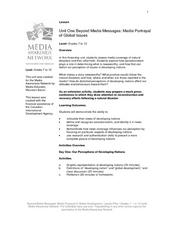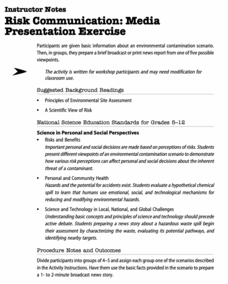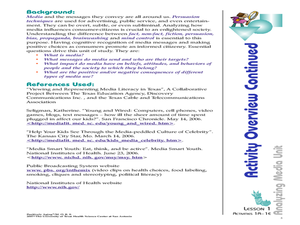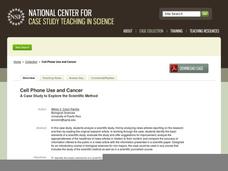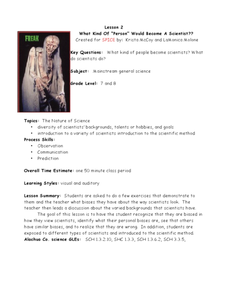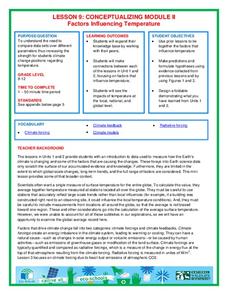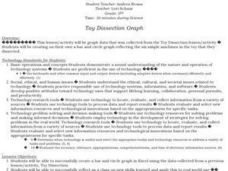Curated OER
Beyond Media Messages: Media Portrayal of Global Issues
Take a close look at news reporting techniques and global issues. Begin by creating a graphic representation of developing nations and defining the term. After class discussion, the second day's activities pick up by deconstructing news...
Curated OER
Risk Communication: Media Presentation Exercise
Students work in groups to prepare a brief broadcast or print news report from one of five possible viewpoints about an environmental contamination scenario. Students are given basic information about a chemical spill in a small town and...
Curated OER
Analyzing Media Unit Sequence of Five Activities
Seventh graders define terminology and explore the effects media has on our society and on individuals. In this media evaluation lesson students work cooperatively and solve problems.
Beyond Benign
The Story of Cosmetics Video Assessment
Does your shampoo contain carcinogens? Scholars learn how cosmetic companies create and market their products, many of which contain toxic chemicals. They examine the bias and consumer responsibilities in the industry.
National Center for Case Study Teaching in Science
Cell Phone Use and Cancer
The cell phone you're using is making you deaf: news at 11:00. Oftentimes, the media uses fear tactics and other techniques to increase its audience base. In an intriguing look at the difference between scientific journals and...
Curated OER
Stereotype & Bias
Students examine the way that the media perpetrates stereotypes. In this stereotyping lesson students complete several activities on stereotyping.
Curated OER
What Kind of "Person" Would Become a Scientist?
"Scientist Stereotypes" could be another name for this lesson! Begin by drawing from middle schoolers' preconceived notions and media portrayal of scientists, and then explain that anyone can be a scientist. Even though there is an...
National Wildlife Federation
Conceptualizing Module II - Putting It All Together
"Creativity is just connecting things." - Steve Jobs. After weeks of researching climate change, the ninth activity in a series of 21 combines the data and analysis to address essential questions. It covers natural phenomenon, human...
Curated OER
Empowered Barbie
Students access prior knowledge of vocabulary on feminism and psychoanalytic theory, and gender schema. In this Empowered Barbie lesson plan, students recreate a Barbie doll. Students write a reflection on how they changed...
Columbus City Schools
Asexual and Sexual Reproduction
Can you name a type of reproduction that produces no variation in the offspring? The multimedia lesson covers both sexual and asexual reproduction through videos and discussions. It includes topics such as genetic modification, meiosis,...
Curated OER
What Makes a Cat a Cat?
Students investigate the lives of pets by videotaping them. In this animal life lesson, students videotape a cat and other pets using school cameras in a computer lab. Students review the footage from the cat and other...
Curated OER
Genetic Research and Liberties
High schoolers examine civil liberties issues in relation to genetic research, and discuss how genetic medical information may be used. They present personal viewpoints about genetic research as it relates to civil liberties
Curated OER
Point of View
Students participate in an inkblot test to discuss how what they see is different than their classmates. After viewing various artifacts, they write down what they believe the object is and then they are placed into a group to discuss...
Curated OER
The Transit in Pictures
Young scholars investigate the Transit of Venus and create and produce a public service commercial promoting the Transit of Venus and providing information about its safe viewing.
Curated OER
Toy Dissection Graph
Students explore simple machines and how they are made. They examine the parts of the simple machine and collect information about its parts. Using Excel, students create circle and bar graphs from the collected data.
American Institute of Biological Sciences
Action Bioscience: Beach Closings: Science Versus Public Perception
The media is relaying inaccurate information as to why an increasing number of beaches are being closed. Understand the scientific reasoning for the closures versus the political and economic motivated reasons.
Other popular searches
- Bias in the Media
- Media Bias Iraq War
- Bias in the News Media
- News Bias and Discrimination
- Identifying Media Bias
- Detecting Media Bias
- News Bias
- Iraq Media Bias
- Iran Media Bias
- Television News Bias
- Bias in News Media
- Bias in News Media Race


